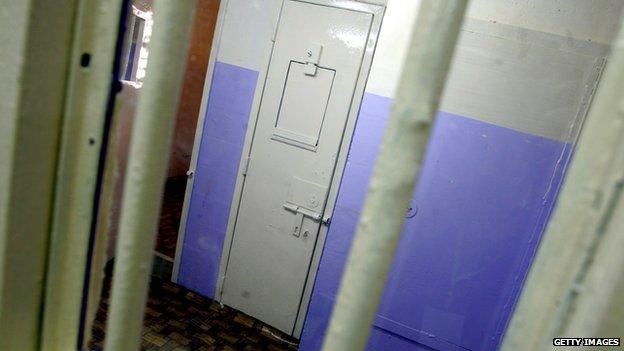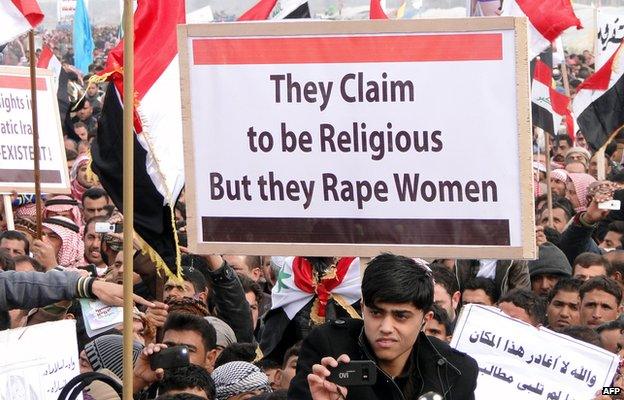Iraqi security forces 'abuse female prisoners'
- Published

More than 4,200 women are currently being held in prisons across Iraq
Iraqi security forces are detaining thousands of women illegally and subjecting them to torture and abuse, a new report by Human Rights Watch says.
Many were held for months or even years without charge, the report found, external.
Interrogators often questioned them about their male relatives' activities rather than the crimes in which they themselves were implicated, it said.
The government called the claims "over-exaggerated", but admitted a number of female detainees had been mistreated.
"We have some limited illegal behaviours which were practised by security forces against women prisoners," a spokesman for the human rights ministry said. "Iraq is still working to put an end to prison abuse."
He added that those responsible would be held accountable.
'Second-class status'
More than 4,500 women are currently being held in prisons across Iraq, according to the 105-page report, titled "No One is Safe" - The Abuse of Women in Iraq's Criminal Justice System.
A vast majority of them are Sunni Muslims, but the abuses documented by HRW showed "women of all sects and classes" were affected.
Many of those interviewed described being "beaten, kicked, slapped, hung upside-down and beaten on their feet, given electric shocks, and raped or threatened with sexual assault by security forces during their interrogation".
Sexual violence was so commonplace that one employee at a women's prison facility was quoted as saying: "We expect that they've been raped by police on the way to the prison."
Contrary to Iraqi law, most of the female detainees had no access to a lawyer before or during their interrogations, the study found.
"Iraqi security forces and officials act as if brutally abusing women will make the country safer," said Joe Stork, HRW's deputy Middle East and North Africa director.
"Both men and women suffer from the severe flaws of the criminal justice system. But women suffer a double burden due to their second-class status in Iraqi society."

The alleged mistreatment of women detainees has angered Iraq's Sunni community
In late 2012, Sunnis took to the streets demanding that the Shia-led government release women who were being held without charge or because of acts of terrorism allegedly committed by their relatives.
But HRW said Prime Minister Nouri al-Maliki had failed to carry out his promised reforms of the criminal justice system.
Several judges who tried terrorism cases alleged that some investigative judges were still committing serious violations of suspects' due process rights because of their "collusion with security officers and because of the considerable influence Maliki exerts over the judiciary", the report said.
Iraq has seen a surge in violence over the past year. Government data says more than 1,000 people died in January, which would be the highest monthly toll for almost six years.
HRW warned that the security forces' heavy-handed tactics and alleged abuses in Sunni-dominated areas were "undermining the government's military efforts" to combat insurgents linked to al-Qaeda who have attempted to take control of the cities of Falluja and Ramadi.